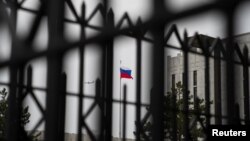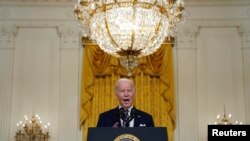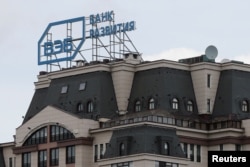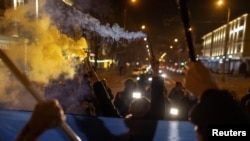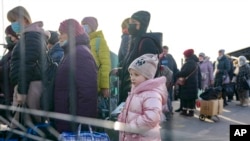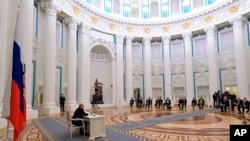U.S. President Joe Biden cut off the Russian government from international financing on Tuesday and imposed sanctions on two large banks, declaring that its actions in Ukraine were “a flagrant violation of international law.”
In a brief White House speech, Biden said Putin’s order late Monday to send troops across the eastern Ukraine border into the Luhansk and Donetsk regions was “the beginning of a Russian invasion of Ukraine.” Hours earlier, Putin declared the regions as independent, no longer part of Ukraine.
Biden pointedly asked, “Who in the Lord’s name does Putin think gives him the right to declare new so-called countries on territory that belonged to his neighbors?”
The condemnation came from many other U.S. allies and multilateral institutions, including from United Nations Secretary-General António Guterres, who said Tuesday, “Let me be clear: The decision of the Russian Federation to recognize the so-called “independence” of certain areas of Donetsk and Luhansk regions is a violation of the territorial integrity and sovereignty of Ukraine.”
Biden also ordered the movement of infantry troops and air support from elsewhere in Europe closer to Russia’s borders, as the region girds for possible confrontation.
Biden said additional U.S. forces were deploying to the Baltics to “send an unmistakable message that the United States, together with our allies, will defend every inch of NATO territory.”
The latest deployments include a battalion of more than 800 troops deploying from Italy to the Baltic region, eight F-35 fighter jets and 20 Apache attack helicopters from Germany to the Baltics, and 12 Apaches from Greece to Poland.
But Biden stressed, “These are totally defensive moves on our part. We have no intention of fighting Russia.” He added, “None of us should be fooled; none of us will be fooled” by Putin’s intentions in deploying what he characterized as “peacekeeping forces” into the one-time Soviet republic.
For now, the administration says its strongest weapon is sanctions aimed at Russia’s power players. The U.S. leader said his sanctions would cut off the Russian government “from raising money from the West,” and vowed that Russia “will pay an even steeper price (with more sanctions) if its forces advance further” west into Ukraine.
The sanctions announced Tuesday target three men in Putin’s inner circle: Aleksandr Bortnikov, head of the Federal Security Service; Sergei Kiriyenko, a top official in Putin’s office, and Peter Fradkov, chairman of Promsvyazbank.
A senior administration official told reporters that the sanctions target two banks especially close to Russia’s leadership, including one — Vnesheconombank — that holds more than $50 billion in assets. Daleep Singh, deputy national security adviser for international economics, described it as “a glorified piggy bank for the Kremlin.”
“Make no mistake — this is only the sharp edge of the pain we can inflict,” he said.
Some analysts say the administration could have done more.
“The sanctions announced (Monday) will have almost no impact, either in economic or political terms,” Chris Miller, a Russia analyst at the American Enterprise Institute, told VOA. “The sanctions announced today — notably the sovereign debt sanctions — will have a minor, negative macroeconomic impact on Russia.”
On Tuesday, Biden also met at the White House with Ukraine’s foreign minister and ”reiterated the readiness of the United States, in close cooperation with our Allies and partners, to respond swiftly and decisively to any further Russian aggression against Ukraine,” the White House said.
In a speech at the Kremlin on Monday, Putin declared that Ukraine was never an independent state and was part of a greater Russian sphere of influence, not a “puppet” of the West.
“He directly attacked Ukraine’s right to exist,” Biden said of Putin, adding that there is “still time to avert the worst-case scenario” of a full-on invasion through diplomatic settlement of the crisis.
But, Biden concluded, “We’re going to judge Russia by its actions, not its words.”
Biden warned Americans, “Defending freedom will have costs,” with higher gasoline prices as world oil prices surge with the threat of further violence in Ukraine and an expanded Russian invasion.
Biden’s implementation of long-promised sanctions came as other Western allies quickly moved Tuesday to punish Russia with sanctions of their own.
German Chancellor Olaf Scholz halted authorization for Nord Stream 2, the completed but not yet operational natural gas pipeline under the Baltic Sea from Russia to Germany, at least temporarily curbing potential fuel deliveries to Germany but also depriving Moscow of revenue from the pipeline.
British Prime Minister Boris Johnson told Parliament he had sanctioned five Russian banks and three “high net worth” executives, freezing their assets in Britain and cutting off financial transactions with them.
“This is the first tranche, the first barrage, of what we are prepared to do,” Johnson said.
Russian lawmakers on Tuesday gave Putin permission to use military force outside the country, possibly presaging a broader attack on Ukraine
European Union foreign policy chief Josep Borrell said that “Russian troops are on Ukrainian soil” in Donetsk and Luhansk but that it was not a “fully fledged invasion.”
For weeks, the U.S. and European allies have warned of swift and severe consequences for Russia if it launched an invasion of Ukraine, a possibility viewed with growing concern as Russia deployed 150,000 troops and military equipment along its border with Ukraine and in Belarus, a Russian ally to the north of Ukraine.
Russian tanks entered eastern Ukraine’s Donbas region overnight, Western diplomats and residents in Donetsk confirmed to VOA. It was unclear if their presence constituted significant movement of Russian forces or instead movement of Russian-backed militias already in eastern Ukraine.
Biden issued an initial set of sanctions Monday in response to Putin’s recognition of the breakaway regions and his order to deploy what he called Russian peacekeeping forces.
A senior Biden administration official told reporters that the first round of sanctions was specifically tied to those actions and did not represent the “swift and severe economic measures we have been preparing in coordination with allies and partners should Russia further invade Ukraine.”
Biden’s Monday order prohibited new investment, trade and financing by Americans in Luhansk and Donetsk after Putin declared them independent from Ukraine.
From a desk at the Kremlin, Putin delivered a nearly hourlong televised address to the Russian people on Monday, outlining his version of the history of national boundaries in Europe and the 1990s breakup of the Soviet Union.
Putin also said there was “no prospect” for peace to end the fighting in eastern Ukraine, but Moscow has contended it has no plans to launch a full-scale invasion of Ukraine.
“This wasn’t a speech just about Russia’s security,” a senior U.S. administration official said. “It was an attack on the very idea of a sovereign and independent Ukraine. He (Putin) made clear that he views Ukraine historically as part of Russia. And he made a number of false claims about Ukraine that seemed designed to excuse possible military action. This was a speech to the Russian people to justify war.”
Carla Babb and Margaret Besheer contributed to this report.




